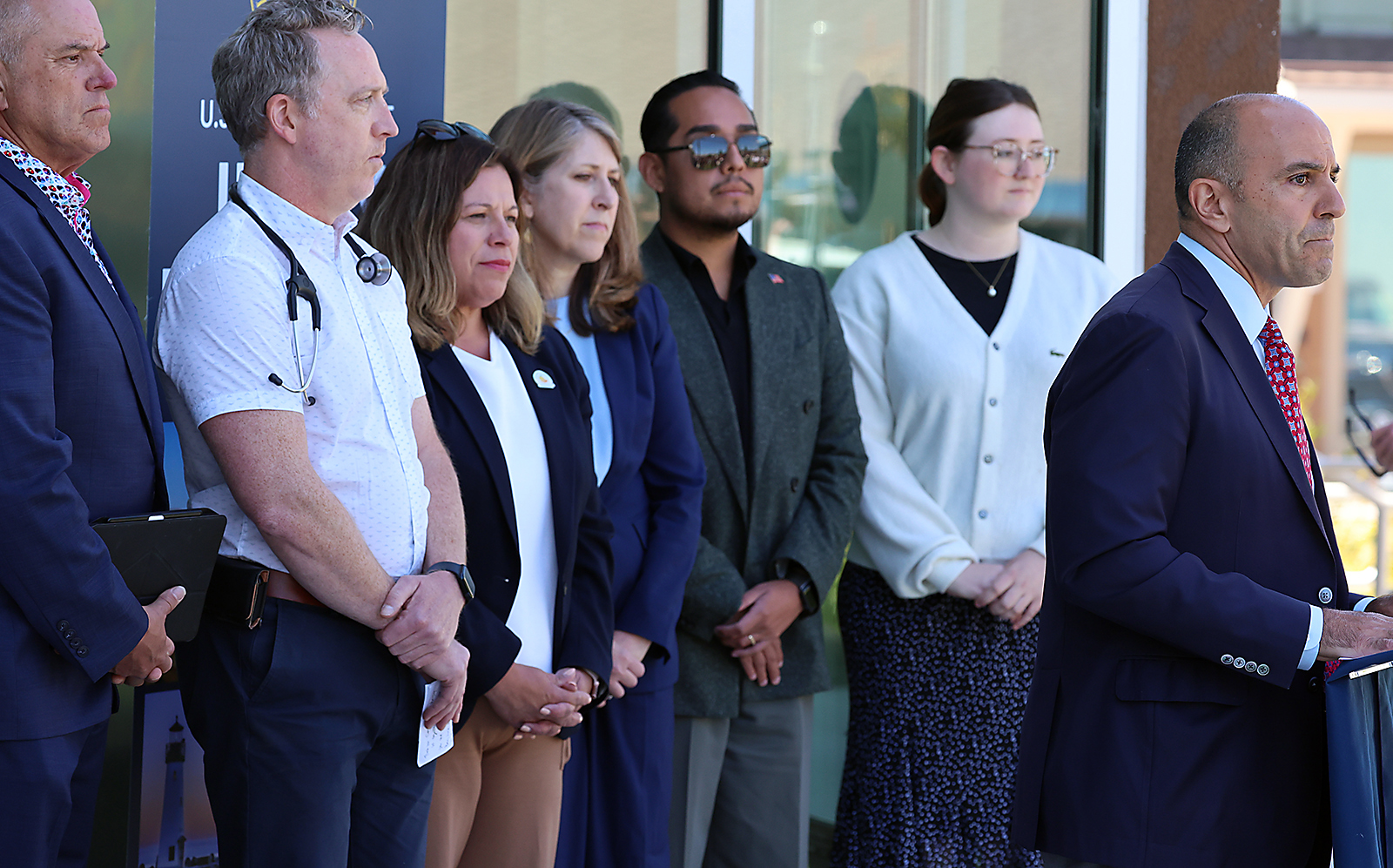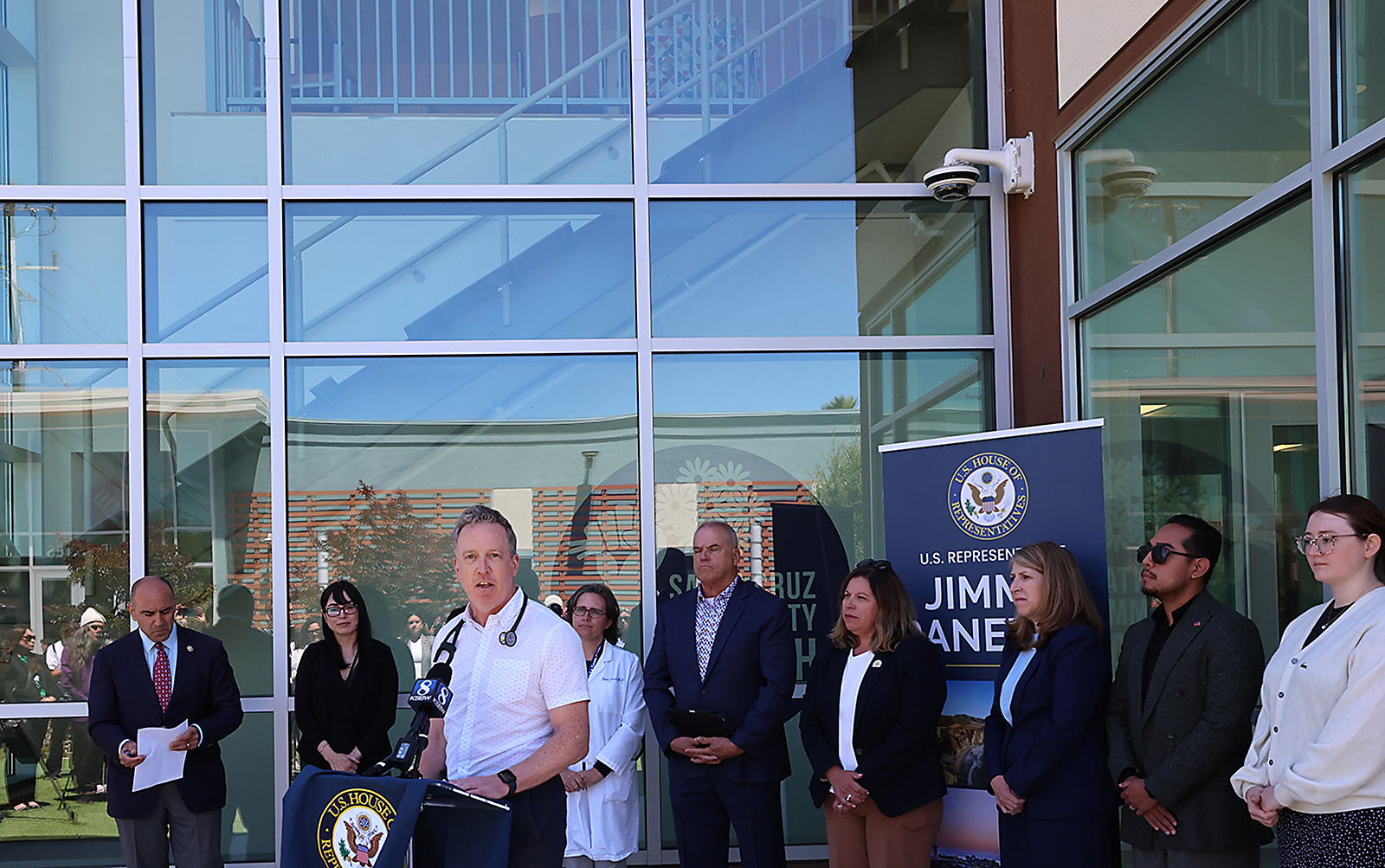

LIVE OAK >> The ink is barely dry from President Donald Trump’s sign off on the Republican-sponsored spending bill passed last week by Congress, but local health care leaders are wasting no time when it comes to highlighting what the fallout from the legislation might look like in Santa Cruz County.
Rep. Jimmy Panetta convened on Tuesday in Live Oak with a handful of nonprofit and government agency health experts who said that while Trump’s spending plan signed into law may be big, it is anything but beautiful.
“The ridiculous monikers around this ‘(Big Beautiful Bill)’ B.S. is backwards. This is a backward facing piece of legislation,” said Dr. Casey KirkHart, medical director of Santa Cruz Community Health, which is a federally qualified health center. “This threatens programs we’ve established for our community to provide these essential services. This threatens the budgets of each of our organizations; this threatens the hundreds of jobs we provide here in the community; this threatens my ability to provide high-quality medical care.”
‘Self-inflicted wound’
The almost 900-page bill, signed by Trump July 4, included massive spending reductions to Medicaid and the Affordable Care Act to pay for about $4.5 trillion in tax cuts that primarily benefit wealthy households. The nonpartisan Congressional Budget Office estimated that 12 million Americans could lose health insurance coverage under the legislation due to its imposition of bureaucratic barriers to Medicaid access, slashing of retroactive coverage and capping of provider tax credits critical to California’s Medi-Cal system.
In Santa Cruz County alone, almost 71,000 residents are Medi-Cal enrollees and about 37,000 of those beneficiaries — including those utilizing the Affordable Care Act — stand to lose coverage, according to speakers at the event.What does this mean for the local health care landscape? Strained budgets for health care providers, longer wait times at local hospitals, patients foregoing preventative care and higher premiums for private insurance holders were named as just a few of the projected consequences.
“It takes away decades and decades of essential work we’ve done to expand health care; expand essential services,” added KirkHart.
The event was held outside a health campus in Live Oak shared by Santa Cruz Community Health and Dientes Community Dental — two organizations serving communities that stand to suffer most from the federal actions.
Dientes said the bill will cause a decline in dental care access, which leads to tooth decay and negative health outcomes. The Supplemental Nutrition Assistance Program, also known as CalFresh in California, also faces steep cuts that could deny millions access to reliable meals.
Panetta admitted that he enjoys doing press events to highlight congressional work that impacts his constituents in meaningfully positive ways. But he said there’s no such thing in this bill, which he called “a self-inflicted wound” that will hurt working families across the country.
Budget priorities
Meanwhile, Republicans have repeated that the changes are meant to address government waste, fraud and abuse while providing billions for Trump’s ongoing immigration crackdown. The legislation includes $350 billion for the U.S.-Mexico border wall, the hiring of 10,000 new Immigration and Customs Enforcement officers, as well as establishment of 100,000 migrant detention facility beds, according to the Associated Press.
Panetta, D-Carmel Valley, noted that the cuts come in response to tax breaks that were first passed by a Republican Congress during Trump’s first term in 2017.
“That’s $4 trillion in tax breaks for billionaires, for corporations,” said Panetta. “It’s all paid for by adding $3.8 trillion to our debt, $3.4 trillion to our deficit over the next 10 years, but also by slashing nearly $1 trillion in Medicaid services.”
Panetta took special aim at the 80-hour-a-month work requirements and additional eligibility verifications by characterizing them as punitive and ineffective. He said similar policies were previously rolled out in Arkansas, Georgia and Michigan, and it led only to more red tape, less health care coverage and higher administrative costs.
“We do not want to put up roadblocks, restrictions or barriers for people having essential health care,” said Panetta, “especially those that need Medicaid.”
Dr. Devon Francis is the chief medical officer at Salud Para La Gente, which is also a federally qualified health center that primarily serves Medi-Cal beneficiaries. Francis said that the federal cuts won’t result in Salud turning community members away from the care they need — a core feature of the organization’s mission. It just means the rate of uncompensated care will go up dramatically and providers will have to scramble to make up the difference.
“That could mean more overcrowding in emergency departments, that could mean reduced staffing, higher premiums for those who have private insurance or just reducing service lines altogether,” said Francis. “Everyone is going to feel the impact of these cuts regardless of if you are covered by Medi-Cal or have private commercial insurance.”
When will impacts surface?
But while the picture of how local services could change is relatively clear, the timeline for when they will do so is more opaque, according to the group of experts.
As details of the law continue to get ironed out by congressional leaders, Santa Cruz County Health Officer Lisa Hernandez said local officials are expecting the California Legislature to call a special session this fall after the federal budget has been finalized. Lawmakers will then decide if the state’s budget needs to be adjusted to help fill the gap.
Assistant County Executive Officer Nicole Coburn added that the county has stood up a special team that will monitor for any developments in this regard.
“A lot of these impacts trickle down from the federal government to the state government to the county,” said Coburn. “We will of course be looking at what happens in the fall if the state holds a special session. Depending on what happens then, if there are impacts locally, we may have to have a special session ourselves, in terms of the county budget.”
To further contextualize things, Panetta said the bill’s priorities were “politically motivated,” as evidenced by the fact that the tax cut provisions for wealthy individuals and families will be immediately enacted, while many of the health care changes won’t be actualized until after the 2026 midterm congressional elections.
“The question that I think all of us should be struggling to answer, based on this legislation is: How much longer can the greatest debtor in the world be the greatest nation in the world?” said Panetta. “This is something we as Americans have to answer and have to hold accountable the president and any representatives that, basically, support this bill and demand that they answer that question.”



